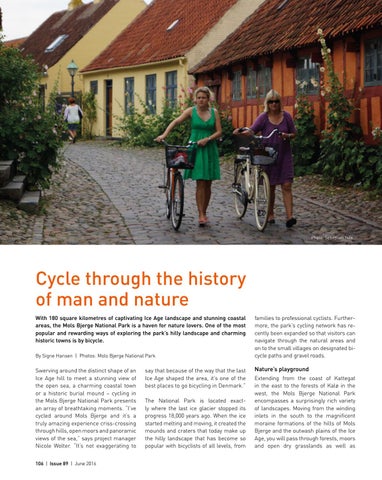Scan Magazine | Culture Feature | Nationalpark Mols Bjerge
Photo: Sebastian Nils
Cycle through the history of man and nature With 180 square kilometres of captivating Ice Age landscape and stunning coastal areas, the Mols Bjerge National Park is a haven for nature lovers. One of the most popular and rewarding ways of exploring the park’s hilly landscape and charming historic towns is by bicycle. By Signe Hansen | Photos: Mols Bjerge National Park
Swerving around the distinct shape of an Ice Age hill to meet a stunning view of the open sea, a charming coastal town or a historic burial mound – cycling in the Mols Bjerge National Park presents an array of breathtaking moments. “I’ve cycled around Mols Bjerge and it’s a truly amazing experience criss-crossing through hills, open moors and panoramic views of the sea,” says project manager Nicole Wolter. “It’s not exaggerating to 106 | Issue 89 | June 2016
say that because of the way that the last Ice Age shaped the area, it’s one of the best places to go bicycling in Denmark.” The National Park is located exactly where the last ice glacier stopped its progress 18,000 years ago. When the ice started melting and moving, it created the mounds and craters that today make up the hilly landscape that has become so popular with bicyclists of all levels, from
families to professional cyclists. Furthermore, the park’s cycling network has recently been expanded so that visitors can navigate through the natural areas and on to the small villages on designated bicycle paths and gravel roads.
Nature’s playground Extending from the coast of Kattegat in the east to the forests of Kalø in the west, the Mols Bjerge National Park encompasses a surprisingly rich variety of landscapes. Moving from the winding inlets in the south to the magnificent moraine formations of the hills of Mols Bjerge and the outwash plains of the Ice Age, you will pass through forests, moors and open dry grasslands as well as
